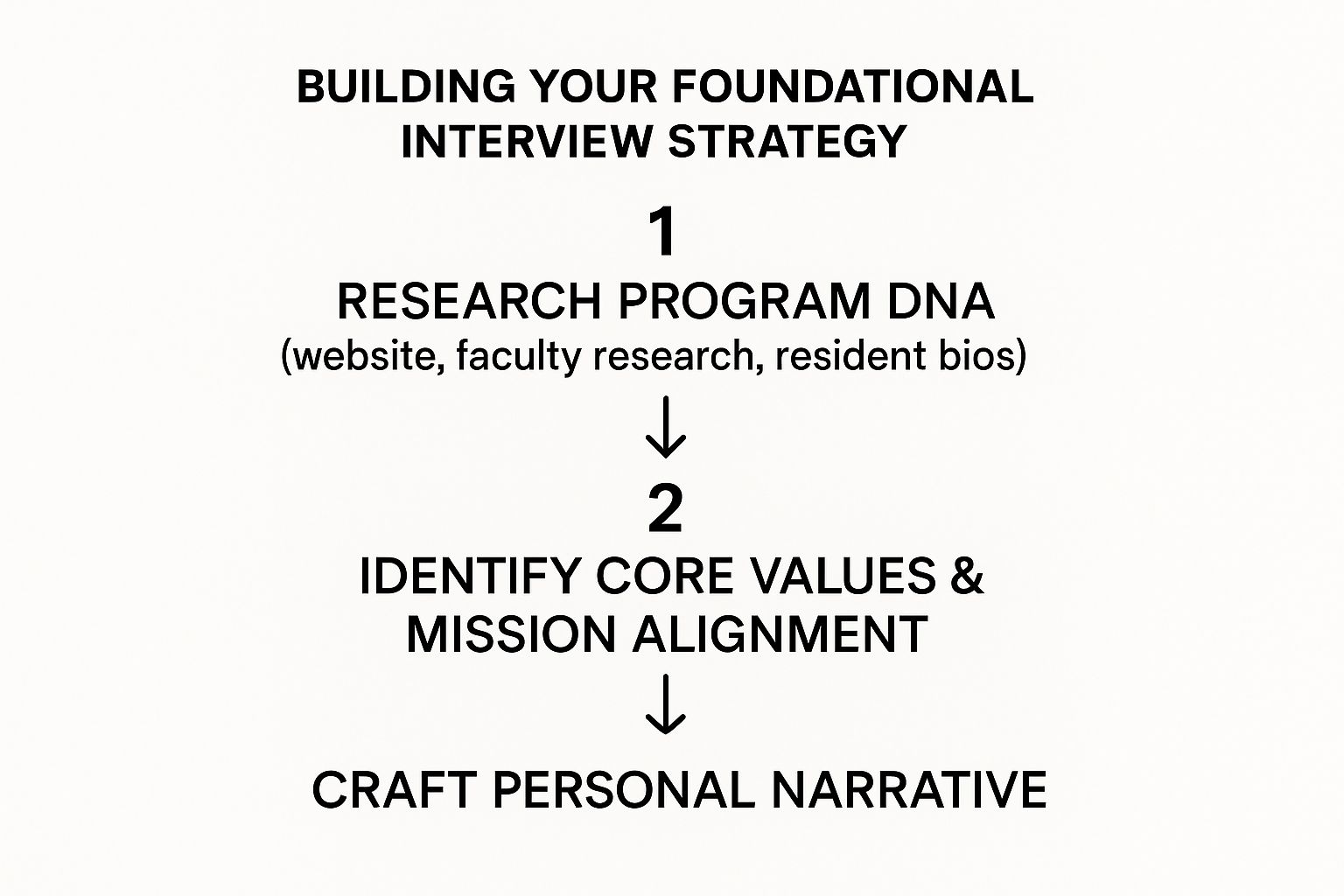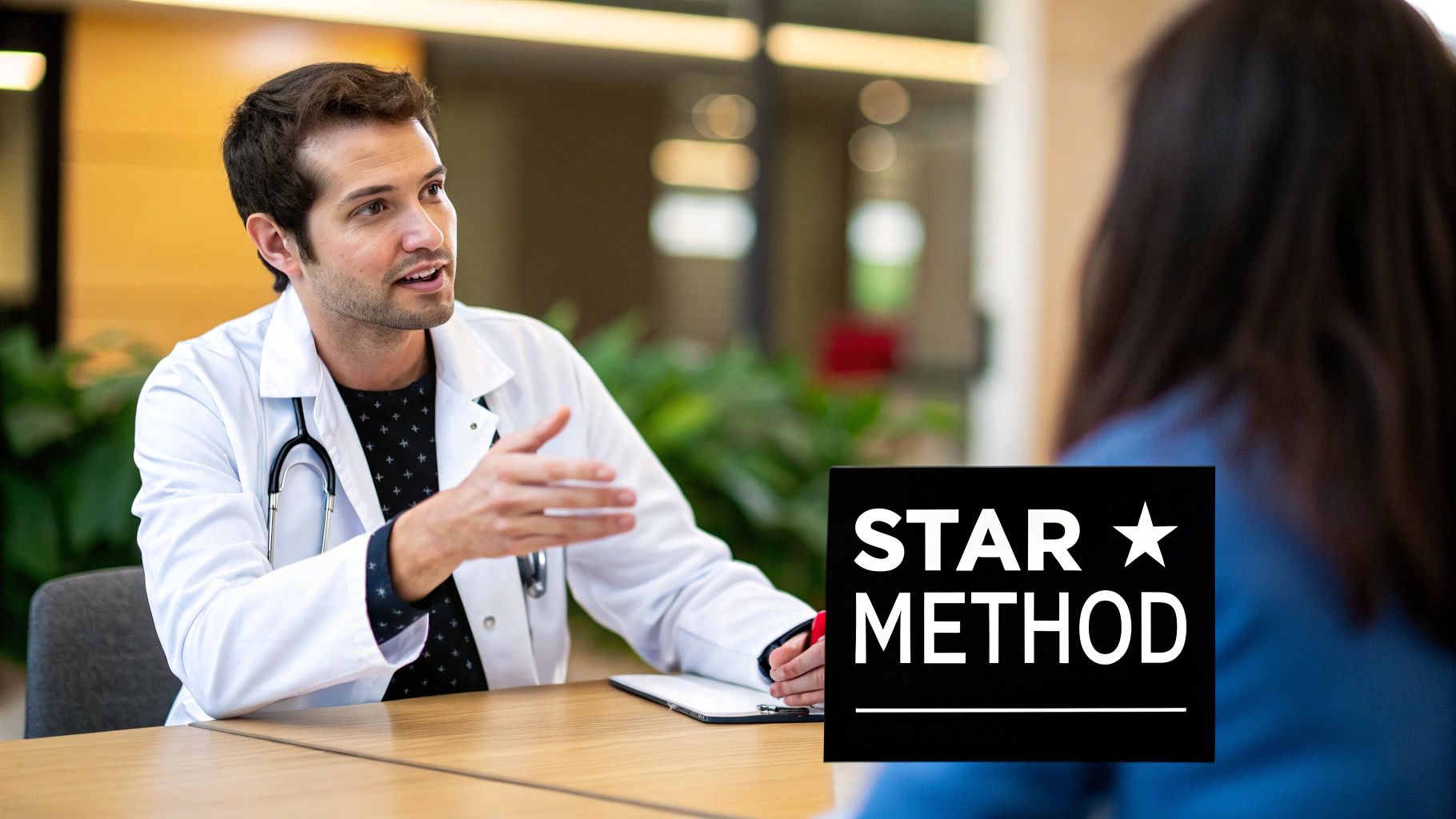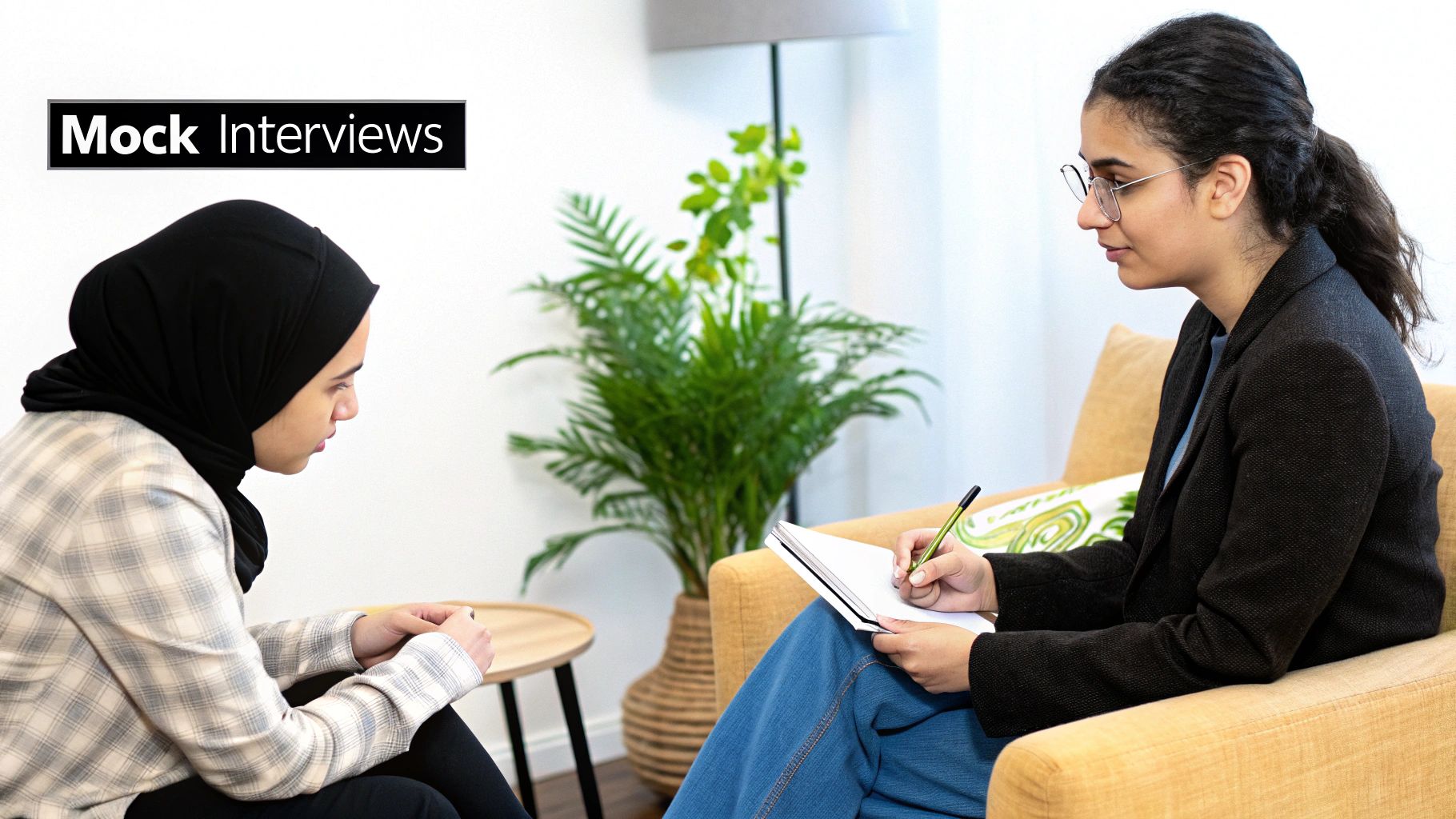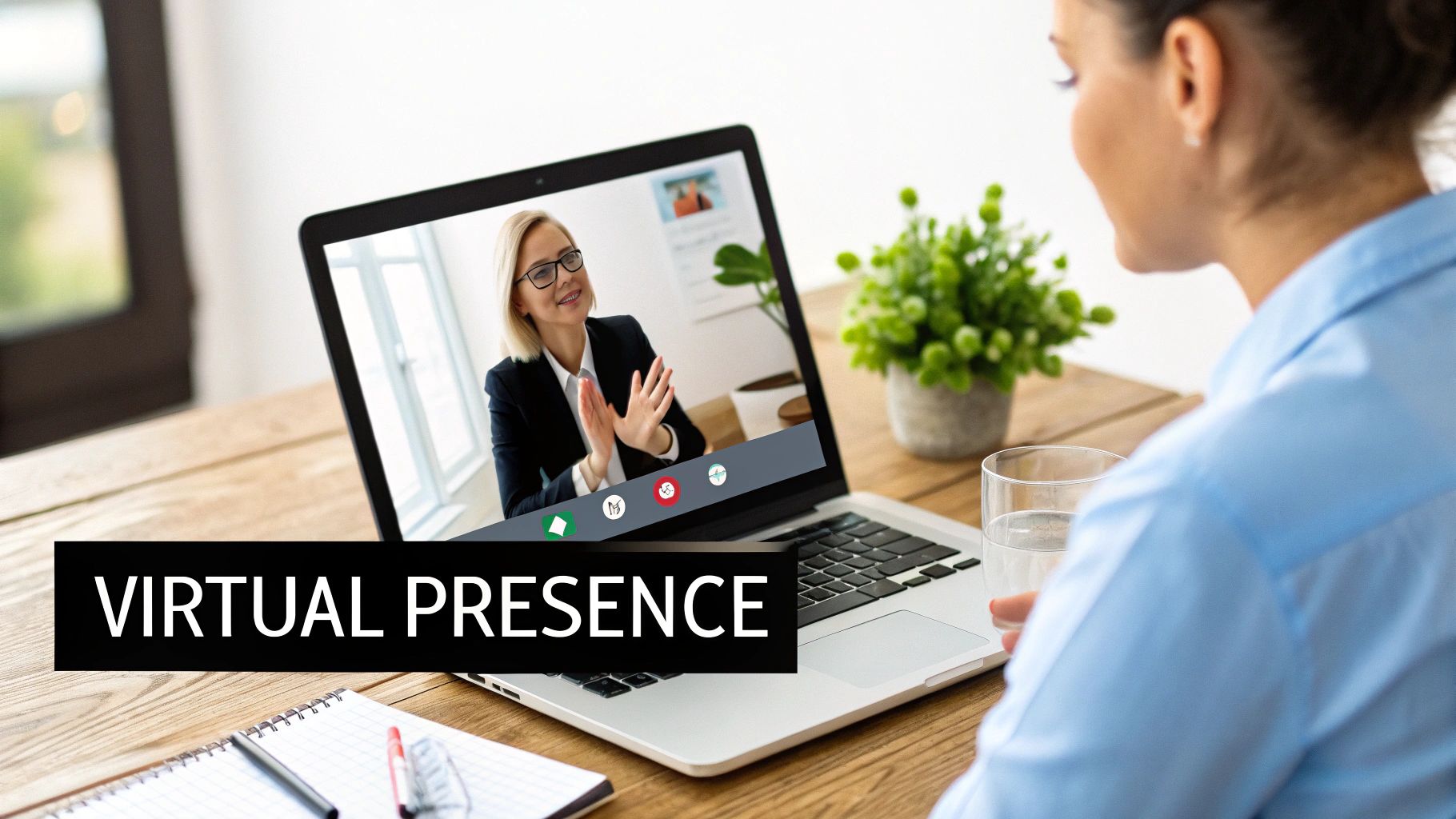Excellent interview preparation for residency is so much more than just rehearsing answers to common questions. It's about doing a deep, strategic dive into what makes each program tick, so you can build a story that truly connects. This is the foundational work that lets you show them why you’re a perfect fit, not just tell them what you’ve done.
Building Your Foundational Interview Strategy
Getting that residency interview invitation is a huge win, but this is where the real work begins. The competition is getting fiercer every year. Just look at the 2025 Main Residency Match, which saw a record 52,498 applicants. With numbers like that, programs are using tougher screening filters than ever before.
This means you can't afford to be generic. Your goal is to move beyond stock answers and show a genuine, well-researched interest in each specific program. Think of yourself as a detective trying to uncover what really makes a program tick.
Deconstructing a Program's DNA
Before you can explain why you’re a great fit, you need to understand who they are—and that goes way beyond a quick scan of their homepage. Your investigation should zero in on three key areas:
- The Website and Mission Statement: Pay close attention to the words they use over and over. Do they talk about "community outreach," "innovation," or serving "underserved populations"? These aren't just buzzwords; they're direct clues to the program's soul.
- Faculty Research: What are the attendings publishing? A heavy focus on basic science tells a different story than a program centered on clinical trials or medical education. This reveals their priorities and the kind of opportunities you'll actually find there.
- Resident Bios and Outcomes: Look at where their current residents came from and where their graduates go for fellowships. This gives you a clear picture of the candidates they value and the career tracks they actively support. It helps you see exactly where you might fit in.
This entire process is about connecting the dots between their identity and your personal story, as shown in the infographic below.

As you can see, the best preparation is a cycle: you research, you find alignment, and you craft a narrative that presents you as the ideal candidate they’ve been looking for.
Crafting Your Personal Narrative
Once you have a solid grasp of the program's identity, it's time to weave your story into theirs. This isn't about making things up. It’s about strategically highlighting the parts of your journey that genuinely align with their values.
For instance, if a program’s website is filled with pictures of residents at community health fairs and their mission statement emphasizes rural health, you can connect that to the meaningful rotation you did in a small-town clinic.
Key Takeaway: The strongest applicants don't just rattle off their accomplishments. They build a compelling narrative showing how their past experiences have specifically prepared them to contribute to that program's future.
This strategic groundwork is a crucial piece of the larger application puzzle. To see how this fits into the big picture, check out our complete residency application timeline for a full step-by-step guide. By putting in the time on this foundational research now, you set yourself up for more authentic and impactful conversations on interview day.
Answering Common and Behavioral Questions

Your CV and board scores get you in the door, but the interview is where programs figure out who you really are. This is where they probe your personality, your resilience, and how you think on your feet. True interview preparation for residency isn't about memorizing canned answers. It’s about learning to frame your experiences as compelling stories that reveal your character and competence.
You’ll encounter two main flavors of questions: the classic inquiries like "Why this specialty?" and the behavioral deep-dives that start with "Tell me about a time when…" Each needs a slightly different approach, but both rely on authentic storytelling.
Structuring Your Core Narrative
Let's tackle the big one first: "Tell me about yourself." This question is a golden opportunity, not an invitation to walk them through your CV line by line. Your goal is to deliver a powerful, 90-second professional summary that connects the dots of your journey.
A fantastic framework for this is the Present-Past-Future model.
- Present: Kick things off with who you are right now. "I'm a final-year medical student with a deep-seated passion for…"
- Past: Briefly touch on the key experiences that brought you to this point. "That passion really solidified during my third-year rotation when I was part of a team managing a complex case of…"
- Future: Tie it all together by showing why their program is the logical next step. "I’m looking to build on my background in X at a program like yours, which is known for its strengths in Y."
This simple structure gives your story a natural, memorable flow. Think of it as your professional elevator pitch, perfectly tuned for the residency interview stage.
Mastering Behavioral Questions with the STAR Method
Behavioral questions are all about evidence. Interviewers work from a simple premise: your past actions are the best predictor of your future performance. They don't just want you to say you're a team player; they want you to prove it with a real story.
This is where the STAR method becomes your best friend. It’s a clean, effective framework for structuring your answers.
- Situation: Set the scene. Briefly describe the context and what was happening.
- Task: What was your specific responsibility in that situation? What needed to be done?
- Action: This is the heart of your story. Detail the specific steps you personally took. Use "I" statements and focus on your contributions.
- Result: What was the outcome? If you can, quantify it (e.g., "This new process reduced patient handoff errors by 15%"). Always cap it off with a quick reflection on what you learned.
Let’s see it in action: An interviewer asks, "Tell me about a time you had a conflict with a team member." Using STAR, you could talk about a disagreement over a patient's care plan (Situation), your duty to advocate for the patient’s safety (Task), how you initiated a private conversation to calmly present evidence-based guidelines and find common ground (Action), and how that led to an improved plan and a stronger working relationship moving forward (Result).
This method stops you from rambling and ensures you hit all the key points that showcase competencies like communication, professionalism, and teamwork. A huge part of your interview preparation for residency should be practicing a few of your most impactful experiences using this format until telling the story feels completely natural.
Your interview is more than a Q&A session; it's a conversation where every answer helps paint a picture of the resident you will be. To help you prepare, let’s break down some common questions to understand what interviewers are really looking for.
Decoding Common Residency Interview Questions
This table will help you look beyond the surface of the question to the core competency being assessed, allowing you to formulate a more strategic and impactful response.
| Question Type | What They're Really Asking | Strategic Approach |
|---|---|---|
| "Why this specialty?" | "Are you genuinely committed? Have you thought deeply about this, or is it a backup? Show us your passion and insight." | Connect your personal values, specific clinical experiences, and long-term goals to the core tenets of the specialty. Avoid generic answers like "I like helping people." |
| "Why our program?" | "Have you done your homework? Do you fit our culture? How will you contribute to our specific program?" | Mention 2-3 specific features of the program (faculty research, unique rotations, community outreach) and explain how they align with your career goals. |
| "Tell me about a weakness." | "Are you self-aware? Can you identify areas for growth and demonstrate a commitment to improvement?" | Choose a genuine, minor weakness. Focus the majority of your answer on the proactive steps you have taken (or are taking) to improve in that area. |
| "Where do you see yourself in 10 years?" | "Are your career goals realistic? Do they align with what our program can offer you? Are you thinking long-term?" | Outline a clear, thoughtful vision that shows ambition but also flexibility. Connect your 10-year plan back to the training and opportunities their program provides. |
| "Tell me about a difficult patient." | "How do you handle stress, ambiguity, and challenging interpersonal dynamics? Can you show empathy under pressure?" | Use the STAR method. Focus on your communication skills, empathy, and the professional approach you took to de-escalate or manage the situation, not on criticizing the patient. |
By understanding the subtext of these questions, you can move from simply answering to strategically demonstrating that you have the exact qualities they seek in a future resident.
Using Mock Interviews to Sharpen Your Skills

Knowing your material is one thing; performing well under pressure is another challenge entirely. Mock interviews are, without a doubt, the single best way to bridge that gap. This is where you turn theoretical knowledge into confident, real-world performance.
And make no mistake, the stakes for that performance are exceptionally high.
Match rates vary dramatically by applicant type. In the 2025 Match, U.S. graduates saw a ~94.2% match rate, while non-U.S. citizen IMGs matched at just 58%. This stark contrast tells us one thing loud and clear: interview preparation for residency can't be one-size-fits-all. It has to be customized to your background, not just the program.
With overall match rates for active applicants sitting at 81.1%, the margin for error is razor-thin. Practice isn't just helpful; it's a decisive factor. You can find more insights on what recent Match Day trends mean for applicants like you.
Finding the Right Practice Partners
The quality of your mock interview depends entirely on who’s on the other side of the table (or screen). Don’t just practice with one person. Aim for a mix of interviewers to get the most well-rounded feedback.
- Mentors and Faculty Advisors: These are the people with institutional knowledge. They've likely sat on admissions committees themselves and can give you invaluable, high-level feedback on the substance of your answers.
- Current Residents: No one offers a more current perspective on what a program actually values. They were in your shoes just a year or two ago and can give you the real insider’s view on the interview day experience.
- Peers: Practicing with fellow applicants is fantastic for building fluency and comfort. You can trade roles, which gives you the incredibly useful opportunity to see things from the interviewer's perspective.
Getting Actionable Feedback
Just going through the motions won’t cut it. You have to actively seek out specific, constructive criticism that goes beyond a simple "that was a good answer."
Your goal is to collect feedback that helps you refine not just what you say, but how you say it. Ask your practice partners to evaluate your pacing, your tone of voice, and your non-verbal cues. Did you seem engaged and confident, or nervous and distant?
After each session, make sure you get feedback on these key points:
- Clarity and Conciseness: Were your answers easy to follow, or did you start to ramble?
- Impact of Examples: Did your stories actually demonstrate the traits you were aiming for, like teamwork or resilience?
- Non-Verbal Communication: How was your eye contact, posture, and use of hand gestures? Were they distracting or engaging?
- Overall Impression: Did you come across as authentic, professional, and someone they could see as a colleague?
This targeted approach transforms a simple practice run into a powerful diagnostic tool. It helps you polish every single aspect of your presentation. By simulating the real thing with focused intent, you build the muscle memory and confidence needed to walk into any interview calm and ready to succeed.
Excelling in the Virtual Interview Setting

The switch to virtual interviews has permanently altered the residency match game, but maybe not in the way everyone expected. It was supposed to level the geographic playing field, right?
Interestingly, a 2022 study found that the median distance between a student's medical school and their residency program was nearly identical for both in-person and virtual interview years. You can dig into the full recruitment patterns on PMC for more details.
The takeaway is clear: convenience hasn't replaced competence. Your ability to crush the interview is still the single most important factor, which puts even more pressure on your performance through a screen. Mastering effective interview preparation for residency now means becoming an expert in digital communication. And that goes way beyond just having a solid Wi-Fi signal.
Mastering Your Digital Presence
Think of your on-screen presence as the new handshake. It's the first—and only—visual impression you'll make, so the small details add up to something big. Getting this right can make a huge difference in how the admissions committee perceives you.
Let's start with framing. Get that camera up to eye level. Seriously, stack some books under your laptop if you have to. This creates a natural, direct line of sight. Frame yourself from the chest up, leaving just a little bit of breathing room above your head. This looks professional and engaging, not like an awkward, floating head.
Lighting is just as important. Your main light source needs to be in front of you, not behind you. A simple ring light is great, but even a well-placed lamp behind your laptop can work wonders. The goal is to eliminate shadows so your expressions come through clearly.
Building Rapport Through the Camera
The absolute hardest part of a virtual interview? Creating a genuine human connection. It's tough, but not impossible.
The trick is to treat your webcam like it's the interviewer's eyes. It feels weird at first, but looking directly into that tiny camera lens is the only way to simulate real eye contact for the person on the other side of the screen.
Keep the conversation feeling dynamic with some subtle non-verbal cues:
- Nodding: This is your go-to move to show you're actively listening and engaged.
- Subtle Hand Gestures: Using your hands a bit when you talk can convey energy and help you articulate your points more naturally.
- Leaning In Slightly: Just like in a real meeting, leaning in a little communicates interest and focus.
Pro Tip: Put a small sticky note with a smiley face right next to your webcam. It’s a simple reminder of where to look and helps you maintain a warm, approachable expression.
Finally, you have to manage screen fatigue. A full day of back-to-back virtual interviews is absolutely draining. Make sure you step away from your computer between sessions. Get up, stretch, grab some water. Staying mentally fresh is non-negotiable if you want to be at your best from the first interview to the last. Your energy level comes right through the screen, and it will directly impact your ability to connect.
Asking Great Questions and Post-Interview Follow-Up
When the interviewer leans back and says, "So, what questions do you have for me?" don't breathe a sigh of relief just yet. This isn't the end of the interview. In many ways, it's one of the most revealing parts.
This is your moment to shift from interviewee to investigator. It's your chance to demonstrate genuine intellectual curiosity and prove you've done more than just a quick scan of the program's homepage. Mediocre questions are ones that could be answered online. Great questions show you've already absorbed that information and are now thinking on a much deeper level.
Having a few thoughtful, specific questions ready for every single person you meet is a non-negotiable part of solid interview preparation for residency.
Asking Questions That Matter
The questions you ask a Program Director should be miles apart from what you ask a PGY-1. Why? Because it shows you understand their role, respect their time, and are trying to build a complete, three-dimensional picture of the program.
When you're speaking with the Program Director, think big picture. Focus on the vision, the future, and the core philosophy of the training environment.
- "What is the biggest change you anticipate for the program in the next five years?"
- "How does the program support residents who are interested in pursuing fellowship opportunities or unique career paths?"
- "Could you describe the program's approach to resident wellness and how you integrate feedback?"
Then, when you meet with current residents, you can get into the nitty-gritty of the daily grind. This is where you get the real, on-the-ground perspective.
- "What does a typical call schedule look like for a PGY-1, and how does the team support each other on tough rotations?"
- "What's one thing about this program that genuinely surprised you after you started?"
- "Outside of the hospital, what's the resident community actually like here?"
This kind of strategic questioning shows you're not just trying to score points; you're genuinely trying to figure out if this program is the right long-term fit for you. For more inspiration, our guide on insightful questions to ask about residency programs has a ton of ideas to get you started.
Navigating the Post-Interview Follow-Up
Your professionalism doesn't stop when you click "Leave Meeting." A prompt and personalized follow-up is the final touch that reinforces your interest and keeps you memorable. The gold standard is sending a thank-you email within 24 hours of your interview.
The absolute key to a thank-you note that doesn't get immediately deleted is personalization. Ditch the generic templates. Seriously. Instead, reference a specific, unique point from your conversation.
Example: "Thank you again for your time yesterday. I particularly enjoyed our discussion about the global health track and how it aligns with my volunteer experience in…"
That one sentence does so much work. It proves you were engaged, helps the interviewer remember exactly who you are, and shows genuine enthusiasm.
Keep the email concise, professional, and triple-check it for typos. The goal is to express gratitude and reiterate your strong interest—not to restart the interview. Learning how to craft a compelling thank you email is a small time investment that can make a huge difference in the final impression you leave.
Finally, always respect the program's communication guidelines and NRMP rules. A single, thoughtful thank-you note is professional. Bombarding the program with emails is not. This final step in your interview preparation for residency closes the loop on a positive and polished note.
Answering Your Top Residency Interview Questions
As you dive deeper into your interview preparation for residency, you're bound to run into some specific, tricky questions. I've been there. This is the stage where the theoretical prep meets real-world scenarios, and it's completely normal to have a few lingering uncertainties.
Let's walk through some of the most common questions and concerns that come up for applicants at this point, so you can build a confident, clear strategy.
How Many Residency Interviews Should I Aim For?
This is the classic question, and the honest answer is: there's no single magic number. The ideal target really depends on your specialty and how strong your overall application is.
The real goal isn't just to get interviews; it's to reach a high probability of matching. NRMP data consistently shows a point of diminishing returns. For most applicants, securing and attending 10-15 interviews at programs that genuinely align with their goals puts them in a very strong position.
Focus on quality, not just quantity. A dozen well-prepared interviews at programs where you're a great fit will always be more valuable than 25 interviews at places you barely researched. Dig into the latest AAMC and NRMP data for your specific specialty to set a realistic target for your profile.
Key Insight: Stop chasing an arbitrary number. Pour your energy into preparing flawlessly for the interviews you do get, especially at programs where your story, skills, and career goals truly connect with what they're all about.
What Are the Biggest Red Flags to Avoid in a Virtual Interview?
It's almost painful how often I see great candidates make simple, preventable mistakes in virtual interviews. The biggest red flags almost always boil down to a sloppy tech setup, a distracting background, or a complete failure to connect through the screen.
Here are the top things you absolutely have to get right:
- A Distracting Environment: Nothing screams "unprofessional" like clutter, bad lighting, or your roommate wandering through the background. It tells the interviewer you didn't take this seriously enough to prepare your space.
- Looking at the Screen, Not the Camera: This is the #1 communication mistake in virtual interviews. When you look at their face on your screen, it looks like you're avoiding eye contact with them. You have to train yourself to talk to that little camera dot. It feels weird at first, but it makes all the difference.
- Reading From a Script: It is always obvious when an applicant is reading their answers. You immediately sound robotic and insincere. It's fine to have your key points jotted down on a sticky note nearby, but you must speak naturally and conversationally.
Should I Send a Thank-You Note After My Interview?
Yes. Full stop. The only exception is if a program explicitly tells you not to.
A concise, professional thank-you email sent within 24 hours is standard practice and a smart final touch. This small gesture is an easy way to reinforce your interest and professionalism.
The real key here is personalization. Don't just send a generic template. Mention something specific you discussed with an interviewer—a shared interest, a unique aspect of the program they highlighted, or a question they asked that made you think. This shows you were paying attention and helps them remember you. Always double-check your emails and interview day documents for any specific instructions on post-interview contact. This thoughtful follow-up is a simple but powerful part of your interview preparation for residency.
To get your answers ready, our guide on common residency interview questions is a great place to start. For a broader look at interview skills, you can also check out these essential job interview practice questions to make your preparation even more solid.
At Ace Med Boards, we specialize in helping you navigate every step of the residency application process, from board prep to interview coaching. Schedule a free consultation today to learn how our expert tutors can help you match into your dream program.
